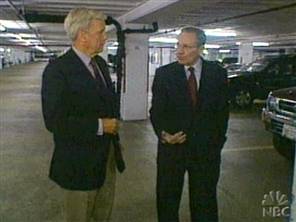The Curse of Celebrity Journalism

Jay Rosen has an excellent piece today on Bob Woodward and why his his much-vaunted "access" is more of a curse than a blessing, both for him and for us:
Woodward and Bernstein of 1972-74 didn't have such access, and this probably influenced -- for the better -- their view of what Nixon and his men were capable of. Watergate wasn't broken by reporters who had entree to the inner corridors of power. It was two guys on the Metro Desk. The more experienced White House reporters didn't think much of the story. Nor did they get wind of the extraordinary abuses of power that were going on at the time.He's right. Entering "the club" seems to come at the price of perspective. For Plan of Attack, Woodward conducted 75 interviews, all of them anonymously sourced except for two -- Bush and Rumsfeld. Nowhere in the book is mention made of, say, Richard Clarke. How are we supposed to evaluate the veracity of this information? Obviously the opinions of dissenters were not cultivated. I can't imagine historians are going to look back on this and view it as the valuable piece of insight Woody imagines it to be -- more like a sadly deluded hagiography by a purveyor of celebrity journalism who couldn't see the abject corruption of the worst administration in US history for his close proximity to it.
(snip)
To say Woodward is where he always is (at the heart of things) denies that there's any price to access. It asserts -- falsely, I think -- that if something as bad as Watergate were happening in Washington today Woodward would be the one uncovering it. I don't buy a word of what Powers is selling about his friend and benefactor, but then I didn't enjoy jock culture, either. That's what "Getting Bob" reminds me of: the twelth guy on the team bragging about the star player. And I don't think Bob Woodward is going to uncover what really happened during the two terms of George W. Bush.


<< Home